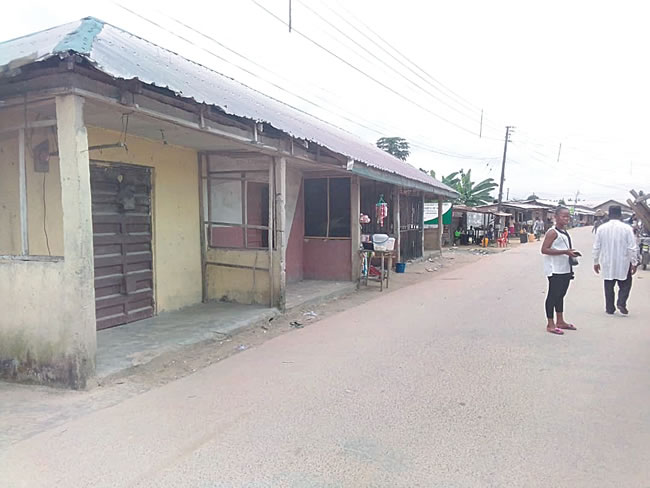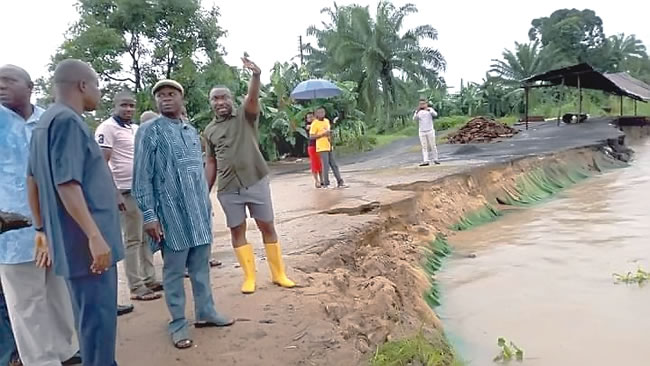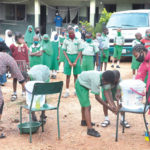In this piece, EBIOWEI LAWAL reports the growing frustration of Bayelsa communities such as Brass, Sangana, Odioma, Koluama, Okpoama and Obogoro under burden of ocean surge tearing at their seams, thereby rendering many of them homeless and jobless.
Whenever environmental issues being faced by communities in Bayelsa State are reported, the first and probably the only challenge that readily comes to mind is environmental pollution occasioned by many years of crude oil exploration and exploitation activities. But today, many villages in the southern Nigerian state are becoming more worried about soil erosion and ocean surge.
Today, in many coastal communities, people have lost or abandoned their houses, while farming and other land activities have been paused due to effects of perennial flooding and erosion. Their ancestral lands are rapidly giving way.
And often times, their major resources of local incomes are abandoned in the process. Therefore, the quality of life significantly drops as many cannot survive within such realities. According to environmental activists, millions of lives are affected as some villages are cut off from the rest of the country while in other areas, schools, hospitals and other basic infrastructure are washed away by the surging waves of the ocean every month.
In Obogoro community in Yenagoa Local Government Area, the building that serves as accommodation for members of the National Youth Service Corps (NYSC) and the only school have collapsed as the erosion is rapidly expanding and claiming more territory for itself.
Other affected communities in the state are Ekowe, Agbere, Peremabiri, Anibeze and Ayama Ijaw all along the Nun River, while Odioma, Okpoama, Sangana, Ezetu and Ekeni, settlements along the Atlantic coastline suffer from ocean surge which has claimed substantial part of their ancestral lands.

Shrinking land spaces threaten communal harmony
And apart from the imminent disappearance of the communities, there is the threat of increased inter-communal clashes resulting from the struggle for shrinking land and spaces for farming and fishing activities. And at the end of each rainy season, new erosion sites develop and older ones expand.
A visit to some of these communities further revealed that beyond losing their homes and farmlands, they have also lost access roads, electricity generators, church buildings and waterside toilet facilities, making it very difficult for dwellers to have access to basic social amenities, such as healthcare services, education and potable water.
More so, the Minister of Water Resources, Suleiman Adamu, has warned that weather predictions show that some parts, of at least 102 local government areas in 28 states, fall within the highly probable flood risk areas this year.
While unveiling the year 2020 Annual Flood Outlook(AFO) and new Flood Mobile App, the minister gave the names of the states to be affected to include Kebbi, Niger, Kwara, Adamawa, Taraba, Benue, Nasarawa, Kogi, Anambra, Delta, Edo, Rivers and Bayelsa states.
At Obogoro, a flood-prone community and not more than five-minute drive away from the Government House in Yenagoa, chiefs, women and youths have raised the alarm, drawing the attention of both the federal and state governments to come to their aid as the Ikoli River overflows its banks, forcing many residents out of their homes.
A visit to the National Youth Service Corps members lodge in the community revealed that parts of the building have been washed into the river, while handy men had pulled off roofing sheets and woods from the building in a bid to save them for future use.
Also, the community primary school that serves as a ground where children from within and outside acquire basic education have also been abandoned because essential parts of the learning facility, which includes the headmaster’s quarters, football field and several classrooms have been swallowed by erosion.
It was also learnt that since St. Paul Primary School, located in Famgbe, a neighbouring community, that would have served as an alternative for Obogoro pupils has long been washed into the river, children from Obogoro are forced to find other strenuous substitutes.
Reports also have it that farmlands with crops worth hundreds of thousands of naira have been lost to the erosion, thereby having adverse effect on the economic livelihood of the people of the community.
Lack of electricity, unemployment causing restiveness among youths—Traditional ruler
Speaking with Nigerian Tribune, the traditional ruler of the community, His Royal Highness, Monday Igodo, said: “right now our primary school is seriously affected. We have lost the lodge for serving corps members to erosion. The river banks are eating into available lands and houses. The serving corps members’ lodge that was very far from the bank of the river is now affected, forcing us to abandon it.
“Well, some of these environmental problems are natural while others are man-made. Ours is natural. It has been there and we have written to many people, even to the Federal Government to come to our aid but nothing has been done.
“Another troubling issue that we have is that we see electricity from across the bridge where the Government House is located but we have not had it in two years. Akaba community has light, Famgbe community has light but we, who are trapped in the middle of these two communities, have not had light in two years.”
The situation, he added, “goes to explain the level of abandonment that we suffer in the hands of government. As a community, we have tried our best to help ourselves by repairing the electricity transformer but it has failed to work. You know that anywhere there is electricity, businesses thrive. And where businesses thrive, there is peace.
“As a community, we are worried about the prolonged blackout and the erosion problems we are experiencing because our youths who engage in trade like welding, hair dressing, sewing, electronic and electrical works are now idle. And our worry is that we don’t want a situation where their idle minds would turn into the devil’s workshop. So we need government assistance urgently”, he pleaded.

‘We have nowhere to go’
Also speaking to Nigerian Tribune, the secretary of the community, Pulumbozibe Yogoi said “the erosion has been our problem for over two decades. And it came gradually, starting from the Famgbe end, a neighbouring community. It has eaten deep into Famgbe and driven that community into the swamp.
“And that is what is going to happen to us if nothing is done about the erosion. Unfortunately in our own case, at the face of this development, we don’t even have where to relocate. Everywhere is occupied now.”
Recounting her experience, the women leader of Obogoro community, Patience Amagbopere, said “when I was newly married into this community, walking from the waterside to the school house was a long distance. But now you can see everything here, even the post is being shifted again and again towards the school, as other parts of the facility have gone into the river.
“You can see the corps members’ lodge here being de-roofed. We want to appeal, as people of Bayelsa that the state government, even the Federal Government should look into our plight. We are begging. Our children cannot go to school here because we are afraid that most of them don’t know how to swim. If a child walks down here and falls into the water the child may drown. We are afraid and that is why we are begging and appealing to the state government to come and restore Obogoro community.
Arable lands lost
“Aside these, we have also lost large parts of our farmland to the erosion. As you know, our major means of livelihood as a people are farming and fishing. Losing our homes to the erosion is traumatising, talk more of losing our means of livelihood. That would mean extinction of Ogbogoro people.”
Expressing fear that his father’s house may soon give way to the devastating spread of the erosion, the Obogoro youth secretary, Inisom Amabopre, told Nigerian Tribune “the situation I find myself is pathetic. The erosion is affecting us badly. The first house built by my father had been washed into the river by the erosion few years back. As you can see the new one my father built to shelter us is now at the edge of the river bank and would soon be washed away in a matter of months.
“Our community is pleading with the state and federal governments to come to our rescue because after the flood comes, when you return to our community you will certainly not see many houses which you see today. They would have been washed away by erosion if nothing is done urgently.”
Also speaking, the youth president, Yambo-Izibe Goodnews, said “Obogoro is just a five-minute drive from the Government House of Bayelsa State, yet we have written several letters to the state’s Ministry of Power informing them of our problems but they have not even visited our community to confirm if we are telling the truth or not. To permanently solve this problem of ours, we need at least three or two functioning transformers installed in our community.”

Erosion claims part of nation’s premier oil and gas polytechnic
In Ekowe community, host to the premier oil and gas Federal Polytechnic of Ekowe in Southern Ijaw Local Government Area that can only be accessed by passenger boats, coastal erosion has also claimed ten per cent of the facilities of the institution, adversely affecting academic activities and productivity of staff and students.
Nigerian Tribune also gathered that due to the lack of access roads, the polytechnic, which has the capacity to host 15,000 full-time and part-time students, is yet to be connected to the national grid, a situation that forces management to run power generating sets for 20 hours.
The Rector, Dr. Seiyaboh Idaho speaking through his executive assistant, Alagha Bibi-Welson, revealed this while addressing newsmen at the liaison office of the institution in Yenagoa, saying that the institution also suffers from perennial flood challenges which have forced about 5,000 students of Bayelsa origin to seek admission in neighbouring Delta State polytechnic.
For communities located on the fringes of the Atlantic Ocean such as Brass, Sangana, Odioma, Koluama, life could not have been harder. Homes and farmlands are being deserted. And in search for new lands to build and farm, communal clashes have resulted as people are beginning to move inwards into lands where they are in contention with their neighbours.
This situation has forced community members to call for concerted efforts in halting the encroachment of the Atlantic Ocean, which they believed was worsened by rising sea levels due to increased oil exploration. Little wonder, the Niger Delta Development Commission (NDDC), which was established in 2000 to offer a lasting solution to the socio-economic difficulties of the Niger Delta region, is enmeshed in corruption investigations recently.
As a result of these challenges, in September last year, the governors of the Niger Delta states visited the president, Muhammadu Buhari, and highlighted the need for the forensic examination of the account of the NDDC to discover why huge sums of money allocated to the region have not helped the people to take the needed quantum leap into the future like every other crude-oil producing regions across the world.
The Deputy Director, Corporate Affairs, Mr. Chijioke Amu-Nnadi, while presenting a paper entitled “The NDDC, Facts, Figures and Falsehood” at a conference, recently, stated the fact that the crude oil rich Niger Delta that is the third largest delta in the world and populated by 31.2 million people is the most underdeveloped region in Nigeria.
Mr. Amu-Nnadi further explained that while the Niger Delta region’s natural resources have supported Nigeria’s rise to being the sixth largest oil producer in the world, 70 per cent of the people in the region live below the poverty line, just as “all indices of development such as education, health, sanitation, job creation, water and other physical infrastructures were far below acceptable standards.
“To address this unfortunate paradox, the Federal Government established the Niger Delta Development Commission (NDDC) through an Act of the National Assembly, the NDDC Act 2000, with the aim to cater to the needs of the nine political states of the Niger Delta region.”
According to him, “To implement its obviously wide mandate, the NDDC at inception adopted a two-pronged strategy, an interim action plan under which all projects abandoned would be completed and new ones executed to douse prevalent tension and a regional master plan that will be a roadmap for integrated, long-term development.
“And since 2001, the NDDC has undertaken well over 8,000 projects, as well as many more programmes in human development, education, empowerment, free health services, agriculture, etc. Over 2 million patients have been treated in the NDDC Free Healthcare Mission, a figure that far outweighs numbers typically treated by some of the best hospitals yearly.
“But after many years of failed promises, lingering mistrust has remained one habit that refused to go away. Even people using NDDC facilities and/or projects, such as roads, still say NDDC has done nothing. It is sometimes difficult to get the communities to support and/or partner with government. For instance, many communities disrupt NDDC projects e.g. the Ogbia – Nembe project.
“Also, there are serious poor governance issues across the region. Despite receipts by other agencies and project providers, there is serious pressure on the NDDC, due to poor allocation, application and implementation issues. Unfortunately, funding has been a lingering issue and NDDC has not received its full statutory due.
“At this point you may want to ask, after the period of praises for being a solution to the problems of the Niger Delta, what went wrong? How did NDDC go from an agency of hope and promise to one which is being investigated for poor delivery on its mandate? The answer would be that we are in the era of emergency projects, budget strictures and undue political influence.”
In response to the appeals of the dwellers of these coastal communities and Atlantic settlements, the Bayelsa State governor, Senator Douye Diri, signed into law the Regulation of Sand Dealing, Dredging and Reclamation Operations Bill 2020, in a bid to curtail and control sand dredging activities along the Nun River.

We don’t want to plunge our state into further degradation—Bayelsa govt
Governor Diri, in a press release by his acting Chief Press Secretary, Mr. Daniel Alabrah, condemned the activities of sand dredgers in the state for carrying out their operations without a recourse to Environmental Impact Assessment (EIA).
He however lauded members of the House of Assembly for their foresight in sponsoring the bill to regulate dredging, saying it would help protect the environment from further degradation.
According to the governor, the activities of sand dredgers had become worrisome as they were partly responsible for most of the natural disasters in some communities.
“We cannot have people dredging sand without an EIA. Nobody talks about the impact such activities cause our environment. This is something that has been bothering me and I didn’t know that the assembly was already working on it to address the problem. A lot of natural disasters all over the place are traceable to some of these acts that we ignore. I am happy that I have assented to this bill to control dredging activities so that we do not plunge our state into further issues of degradation.”
YOU SHOULD NOT MISS THESE HEADLINES FROM NIGERIAN TRIBUNE
TOUGH POLICIES: IMF, World Bank Take Over Nigeria’s Economy •More Pains Ahead For Nigerians
ALTHOUGH this seems a difficult period for Nigerians, Sunday Tribune investigations have, however, revealed that it could actually be a signal to the beginning of more unbearable pains in the form of economic policies as the Federal Government continues to implement the stringent conditions of its international creditors…
What I See Around The Villa — Primate Ayodele
In this interview by KEHINDE OYETIMI, founder of Inri Evangelical Spiritual Church, Lagos, Primate Ayodele speaks on both global and local issues…
High Cost Of Fuel, Electricity Will Ruin Our Lives — Market Leaders, Business Owners Lament
CONDEMNATION of the hike in petroleum products and electricity went notches higher at the weekend as more Nigerians flayed the decision of the Federal Government to take such a decision not minding the fatal blow dealt the economy by the coronavirus pandemic…
No Govt Has Raped Nigeria Like Buhari’s — Labour Leaders
WITH last week’s increase in the pump price of fuel, the organised labour has warned President Muhammadu Buhari against pushing Nigerians to the wall, saying no government has raped the country like the current administration. The labour leaders, in separate interviews with Sunday Tribune, said Buhari has lost touch…
P&ID $10B Scandal: How Govt Officials Frustrated Nigeria’s Case — Shasore
FORMER Lagos State Attorney-General (AG) and Commissioner for Justice, Olasupo Shasore, a Senior Advocate of Nigeria, at the weekend opened up on the salacious scandal trailing the controversial contract crisis between Nigeria and an offshore Shell company, Process and Industrial Development Limited…
What Caused My Rift With Oshiomhole — Obaseki
THE Edo State governor and candidate of the Peoples Democratic Party (PDP), Mr. Godwin Obaseki, has said that one of the reasons his predecessor, Adams Oshiomhole is against his re-election bid is his reversal of the sale of Edaiken Market, which Oshiomhole sold to his friends…







